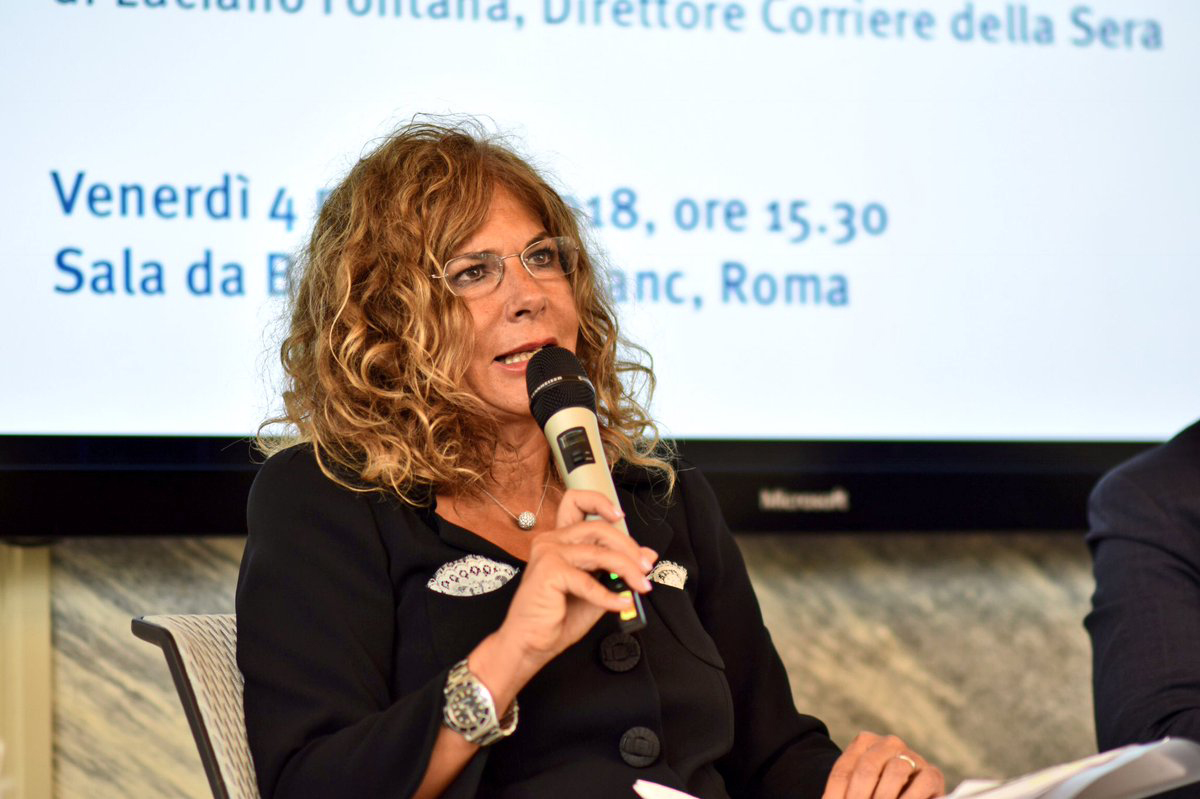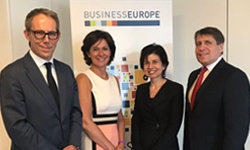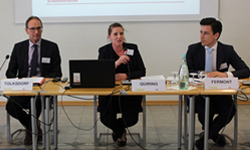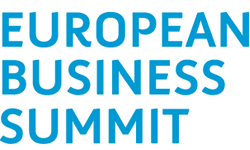BusinessEurope Headlines No. 2018-17
Brexit: time is running fast

“We need to have a withdrawal agreement that includes a transition period before the October European Council to allow time for ratification both in the EU and the UK. This puts a lot of pressure on negotiators to come up with realistic and acceptable solutions”, stated Emma Marcegaglia, President of BusinessEurope, at the event "Brexit: negotiation and beyond” at the LUISS University in Rome, on 4 May. The Chair of the European Parliament Committee on Economic and Monetary Affairs, Member of the European Parliament (MEP) Roberto Gualtieri, and the Chair of the European Parliament Committee on Constitutional Affairs, MEP Danuta Hübner, also participated in the event. Talking about the future relation between the EU and the UK, President Marcegaglia stressed that “companies want to have visibility as early as possible on what the future EU-UK relationship will look like after Brexit. But we are all perfectly conscious that we will not be able to get there until we reach an agreement on the issues related to the exit, including transition. They need to be settled to ensure an orderly withdrawal of the UK from the EU and avoid cliff-edge”. Marcegaglia also highlighted that the new model that will govern EU-UK relations should be in line with three principles. It should preserve the integrity of the EU Single Market based on its four freedoms; maintain economic relations as close as possible between the EU and the UK; and be framed in a way that allows business time to prepare and adjust to the new situation.
Photo copyright: LUISS Guido Carli
Contact: Luisa Santos
Our comment
U.S. withdrawal from the Iran nuclear deal brings political and economic insecurity
By Sofia Bournou, Senior Adviser for International Relations
 U.S. President Trump on 8 May announced his decision not to renew the waivers on key sanctions against Iran and, effectively, pull the U.S. out of the Iran deal. Furthermore, additional sanctions are expected to be introduced over the next months by the U.S. This movement will have negative political and economic consequences in the region and beyond.
U.S. President Trump on 8 May announced his decision not to renew the waivers on key sanctions against Iran and, effectively, pull the U.S. out of the Iran deal. Furthermore, additional sanctions are expected to be introduced over the next months by the U.S. This movement will have negative political and economic consequences in the region and beyond.
Sanctions are foreign and security policy instruments established to deter a threat and exert pressure for policy change. They are notably adopted in cases of grave human rights violations or the proliferation of weapons of mass destruction. Sanctions often take the form of economic measures, including restrictions to trade in goods and trade-related services, as well as asset freezes and restrictions in the movement of capital.
In the case of Iran, it was concern over the country’s capability to develop nuclear weapons that provided the basis for sanctions in 2010. In July 2015, following years of diplomatic efforts and strong leadership by the EU, China, France, Germany, the Russian Federation, the United Kingdom, the United States, the EU and the Islamic Republic of Iran reached an agreement on the latter’s nuclear programme. The so-called Joint and Comprehensive Plan of Action (JCPOA) includes provisions to ensure that the nature of Iran’s nuclear programme is peaceful, in exchange of gradually lifting sanctions, for instance in the area of finance, banking and insurance and imports of oil.
The deal has a strong international and institutional angle. Iran is required to give access in its sights to international authorities such as the International Atomic Energy Agency (IAEA), which monitors and reports on Iran’s compliance with the JCPOA. So far, the IAEA confirms Iran’s compliance. The JCPOA also foresees a mediation mechanism, which can be triggered in case either party of the Agreement believes that commitments are not being fulfilled. Consultations are foreseen and the possibility of notifying the UN Security Council. The role of the IAEA in providing evidence is crucial is this context as well.
U.S. President Trump has decried the Iran deal on a number of occasions. He argues, for instance, that the existence of sunset clauses in the deal will not guarantee that Iran will never be able to build nuclear weapons, or, that the deal is not able to address security concerns that go beyond Iran’s nuclear programme, such as its ballistic missile programme. In our opinion, walking out of the Iran deal is not the best way to address these issues. It may in fact lead to the exact opposite results, risking political and economic insecurity in the region and beyond.
Focusing on the economic aspects, the Iran deal establishes a framework that allows the country’s gradual reintegration in the global economy. The EU used to be Iran’s first trading partner before the imposition of sanctions. Since 2016, bilateral trade is growing again. In terms of trade in goods, in 2017, EU exports to Iran reached €10.8bn and EU imports from Iran €10.1bn. With regards to trade in services, in 2016, EU exports to Iran amounted to €1.2bn and EU imports from Iran to €1bn. Looking at foreign direct investments, in 2016, the EU’s outward stocks reached €4.2bn, while the EU’s inward stocks were calculated at €2.2bn, according to the European Commission, Directorate General for Trade.
Following the implementation of the Iran deal, many European companies, from different sectors, became engaged or returned in the Iranian market. Companies have worked hard in order to put in place systems that would allow them to fully comply with regulations on sanctions. With the U.S. withdrawing from the Iran deal, the realities of business will become more difficult. Even if the reintroduction of U.S. sanctions against Iran will take place over a period of time, there is still a lot of uncertainty surrounding the form of sanctions and the sectors, entities and persons that will be targeted. There are also open questions that will determine the future of existing and pending projects and investments. In this context of uncertainty and confusion, legal clarity is essential for business as well as the political support from the EU and the Member States’ governments.
As avid supporters of joint and multilateral approaches in the field of sanctions policy, we hope that the Iran deal will remain in place and that diplomatic solutions will be sought for to address any additional concerns that may exist. We believe that Iran’s further economic isolation runs counter to this objective.
Contact: Sofia Bournou
BusinessEurope meets new AmCham EU Chairman
 Markus J. Beyrer, Director General of BusinessEurope, met on 7 May Maxime Bureau, who was elected Chairman of the American Chamber of Commerce to the European Union - AmCham EU. In their first meeting, which took place in turbulent times for international trade and the transatlantic relationship, Beyrer and Bureau shared views and compared priorities. Both organisations agree that the EU should be permanently exempted from the impending imposition by the US of additional duties on steel and aluminium. “The current unpredictability is highly detrimental for business and may have a negative impact on jobs and growth. We need to see an effective solution to this crisis”, Beyrer stated.
Markus J. Beyrer, Director General of BusinessEurope, met on 7 May Maxime Bureau, who was elected Chairman of the American Chamber of Commerce to the European Union - AmCham EU. In their first meeting, which took place in turbulent times for international trade and the transatlantic relationship, Beyrer and Bureau shared views and compared priorities. Both organisations agree that the EU should be permanently exempted from the impending imposition by the US of additional duties on steel and aluminium. “The current unpredictability is highly detrimental for business and may have a negative impact on jobs and growth. We need to see an effective solution to this crisis”, Beyrer stated.
Contact: Eleonora Catella
European companies struggle to find opportunities in China’s Belt and Road Initiative
 “Despite the opportunities associated with a $1 trillion initiative to improve connectivity across the Eurasian landmass, European companies have scarcely been able to get involved in implementing BRI projects”, Maurice Fermont, Adviser on Trade Policy at BusinessEurope, said at a conference on Constructing China’s Belt and Road Initiative in Southeast Europe, organised in Berlin. He highlighted that there are opportunities in sectors such as construction, logistics, engineering, and services as well as for legal, consulting, banking and insurance services. But until now European companies have not been able to engage fully. “This is mainly due to a chronic lack of information about projects and how to get involved in them, but also due to the way in which China has employed economic diplomacy, government guarantees, subsidies, Exim financing, and non-transparent tenders as a way to push projects through and allocate contracts to its own companies”, Fermont explained. According to research by the Center for Strategic and International Studies, he added, 89% of companies in Chinese-funded projects are Chinese, while 7.6% are local companies and only 3.4% are non-local, non-Chinese companies. “Companies require more transparency about the projects and how to get involved, and a fair public procurement process, especially in European markets”, he stated.
“Despite the opportunities associated with a $1 trillion initiative to improve connectivity across the Eurasian landmass, European companies have scarcely been able to get involved in implementing BRI projects”, Maurice Fermont, Adviser on Trade Policy at BusinessEurope, said at a conference on Constructing China’s Belt and Road Initiative in Southeast Europe, organised in Berlin. He highlighted that there are opportunities in sectors such as construction, logistics, engineering, and services as well as for legal, consulting, banking and insurance services. But until now European companies have not been able to engage fully. “This is mainly due to a chronic lack of information about projects and how to get involved in them, but also due to the way in which China has employed economic diplomacy, government guarantees, subsidies, Exim financing, and non-transparent tenders as a way to push projects through and allocate contracts to its own companies”, Fermont explained. According to research by the Center for Strategic and International Studies, he added, 89% of companies in Chinese-funded projects are Chinese, while 7.6% are local companies and only 3.4% are non-local, non-Chinese companies. “Companies require more transparency about the projects and how to get involved, and a fair public procurement process, especially in European markets”, he stated.
Contact: Maurice Fermont
European Business Summit: Europe to lead in a changing world
 How to position Europe at the forefront of global economic, social and political changes? With the rise of e-commerce and digitalisation how can the online retail market gain the trust of the consumers? How can the digitisation of the EU industry reinforce its global competitiveness? What is the future ahead of Europe’s circular economy and how do EU initiatives regarding taxation impact the competitiveness of companies? Where are we on the development of artificial intelligence in Europe? How can innovation contribute to achieve smart, sustainable and inclusive growth? These are just a few of the burning questions to be discussed at this year’s European Business Summit in Brussels. Join the debate on 23-24 May and learn how Frans Timmermans, First Vice President of the European Commission, Antonio Tajani, President of the European Parliament, EU Commissioners, other keynote speakers and European business leaders will answer these questions.
How to position Europe at the forefront of global economic, social and political changes? With the rise of e-commerce and digitalisation how can the online retail market gain the trust of the consumers? How can the digitisation of the EU industry reinforce its global competitiveness? What is the future ahead of Europe’s circular economy and how do EU initiatives regarding taxation impact the competitiveness of companies? Where are we on the development of artificial intelligence in Europe? How can innovation contribute to achieve smart, sustainable and inclusive growth? These are just a few of the burning questions to be discussed at this year’s European Business Summit in Brussels. Join the debate on 23-24 May and learn how Frans Timmermans, First Vice President of the European Commission, Antonio Tajani, President of the European Parliament, EU Commissioners, other keynote speakers and European business leaders will answer these questions.
Contact: Joanna Nowak
Calendar
- 16 May: 3rd Mobility Package
- 16 May: 2nd Education Package
- 18 May: BusinessEurope Council of Presidents in Sofia
- 21 May: EU Green Week 2018: Green cities for a greener future
- 22-24 May: Digital Business World Congress in Madrid
- 23-24 May: European Business Summit